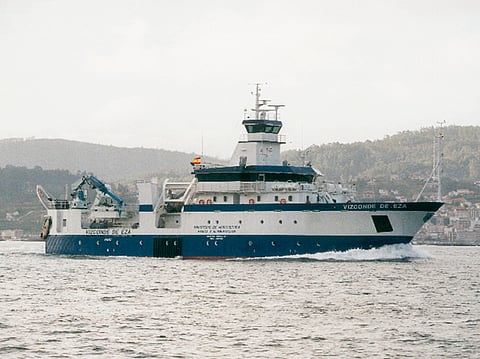

The Northwest Atlantic Fisheries Organization (NAFO) Greenland Halibut 3L operation in the Flemish Pass area, Division 3L, is now in the middle of its mission, which began on August 9 when the oceanographic vessel Vizconde de Eza sailed from the port of St. John's, Canada, to make estimates until August 27, when it will land in Vigo, Spain.
In this seventeenth edition, they are again looking for answers in the area known as the Grand Banks of Newfoundland, both about the species yielding the highest productivity from this area and the surrounding environment.
The Spanish Institute of Oceanography (IEO) leads the scientific direction of the campaign, and its staff is responsible for planning the survey using stratified random sampling. Miguel Oliver and Emma Bardán are the commanders of the fishing research fleet on board the Vizconde de Eza, characterized by its excellent equipment and performance.
This campaign will measure the estimation of abundance and biomass indices, determine the population structure and obtain biological and trophic information on Greenland halibut, as well as companion species such as cod, witch flounder, flounder, black shark, ray, redfish, grenadier, and shrimp. Moreover, the team will identify and record invertebrate data.
Furthermore, this research will also collect information on the oceanographic conditions of the area. The investigation outlined that they would utilize specific probes to gather information about the temperature and salinity of the water column.
Bottom trawl surveys serve as a primary approach for directly examining depleted fish populations. In this case, specifically focusing on Greenland halibut and related species.
Through them, it is possible to obtain independent information on fishing activity. This crucial fact enables informed decisions to be made in fisheries resource management across different areas.
Lastly, the Spanish Ministry of Agriculture, Fisheries, and Food emphasized that this is evidence of Spain's dedication, alongside the EU as the funding entity. The statement concluded by highlighting that an enhanced understanding of the marine ecosystem is vital to ensure its conservation and the sustainable utilization of its resources.
